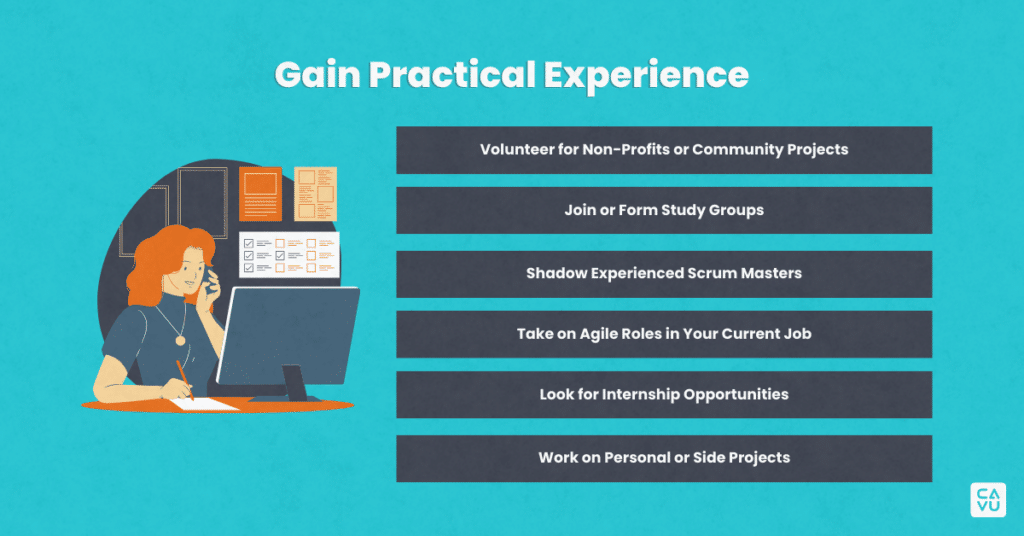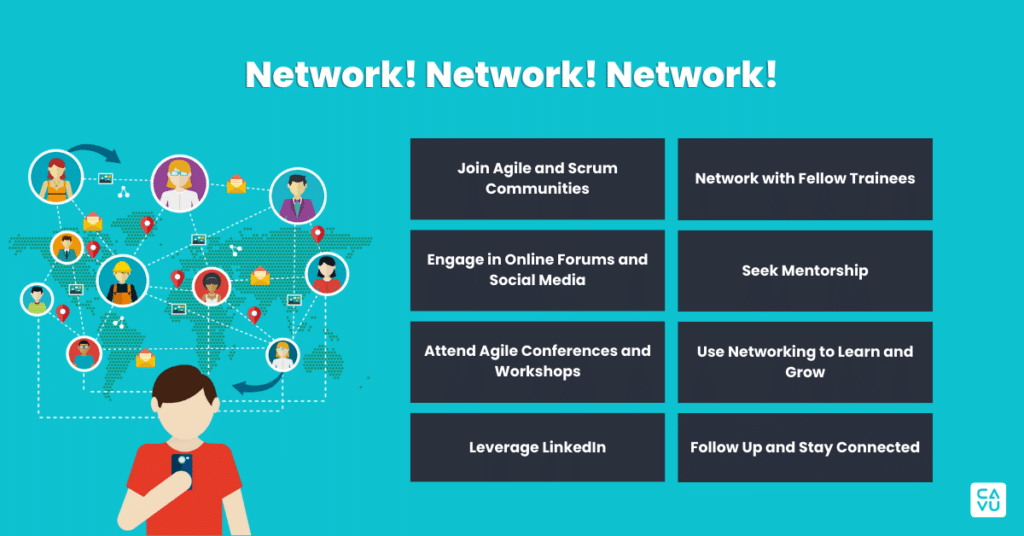Job hunts suck! Especially when you’re trying to break into a new field. Let me be clear: I don’t have a magic pill that will get you that dream job as a Scrum Master. It’s going to take some work. What I can help you with is some guidance and direction on how to land that first job, but it’ll take effort, so let’s get started.
The Scrum Master role is pivotal in ensuring that Agile teams work efficiently and effectively, facilitating communication, removing impediments, and fostering a culture of continuous improvement. Despite the lack of direct experience, your training and certifications have equipped you with the foundational knowledge necessary to excel in this role. (OK, if you don’t have ANY training, then that’s your first step. Shameless plug for our Agile Accelerator program as it’s an affordable option to get you going.)
For the rest of this post, I will assume that you’ve been through training and now you want to land your first job to change the trajectory of your career. It will take some legwork, tons of networking, possibly some volunteer work, but in the end, it will all be worth it.
Gain Practical Experience

Alright, you’ve got the certifications, but now you need to back them up with some hands-on experience. Here’s how you can get your feet wet:
Volunteer for Non-Profits or Community Projects
Non-profits and community organizations often need help with project management and would welcome the structured approach that Scrum provides. Offer your services as a volunteer Scrum Master. This gives you a chance to apply what you’ve learned, gain practical experience, and make a positive impact.
Join or Form Study Groups
Team up with fellow Scrum Master trainees and form a study group. Simulate a Scrum environment where you can practice running Scrum ceremonies, managing a Product Backlog, and facilitating team collaboration. This is a safe space to hone your skills and learn from each other.
Shadow Experienced Scrum Masters
Find experienced Scrum Masters in your network and ask if you can shadow them. Observing how they handle real-world challenges, facilitate meetings, and resolve conflicts will provide valuable insights. If possible, offer to help with their workload in exchange for mentorship.
Take on Agile Roles in Your Current Job
Even if you’re not in a Scrum Master position, you can still practice Agile principles. Volunteer to lead Agile initiatives, suggest running projects using Scrum, or take on responsibilities that align with Scrum Master duties. This shows your proactive approach and gives you concrete examples to discuss in interviews.
Look for Internship Opportunities
Many companies offer internships or trainee positions for aspiring Scrum Masters. These roles are designed to give you practical experience and are a great way to get your foot in the door. Treat these opportunities as extended job interviews—show your enthusiasm, learn as much as possible, and demonstrate your commitment to the role.
Work on Personal or Side Projects
If you’re passionate about a particular hobby or interest, try managing it using Scrum. Whether it’s planning a community event, developing a small software project, or even organizing a family trip, applying Scrum principles to these projects helps you practice the methodology in a low-risk setting.
Remember, the goal is to gather as much practical experience as possible, even if it’s not in a formal job setting. Every bit of practice helps you build confidence, improve your skills, and make your resume stand out to potential employers.
Networking and Community Involvement

Networking can be a game-changer when it comes to landing your first Scrum Master job. The importance of building and leveraging your professional network cannot be overstated. Here’s how you can get started:
Join Agile and Scrum Communities
Look for local Agile and Scrum meetups, user groups, and professional organizations. Websites like Meetup.com often list gatherings where professionals share their experiences, challenges, and tips. These events are great opportunities to meet like-minded individuals and industry experts.
Engage in Online Forums and Social Media
Online platforms like LinkedIn, Reddit, and specialized forums (such as the Agile Alliance and Scrum.org communities) are valuable resources. Participate in discussions, ask questions, and share your insights. Follow and connect with industry leaders, participate in groups, and stay updated on the latest trends and job openings.
Attend Agile Conferences and Workshops
Industry conferences and workshops are perfect for learning and networking. Events like Agile Alliance’s Agile20XX or Scrum Gatherings provide a platform to meet professionals from around the world, attend informative sessions, and participate in hands-on workshops. Plus, you can often meet recruiters or hiring managers looking for talent.
Leverage LinkedIn
Make sure your LinkedIn profile is polished and up-to-date. Highlight your certifications, practical experiences, and any volunteer work. Connect with other professionals in the Agile community, join relevant groups, and actively engage with posts and discussions. Share your own insights and experiences to establish yourself as an active member of the community.
Network with Fellow Trainees
Your fellow Scrum learners can be a great source of support and job leads. Form study groups, attend training sessions together, and keep in touch through social media or regular meetups. They can share their job search experiences, introduce you to their contacts, or even collaborate on projects to gain more practical experience.
Seek Out Mentorship
Find a mentor who is an experienced Scrum Master or Agile Coach. They can provide guidance, share their experiences, and help you navigate the job market. Mentors can offer invaluable advice on what employers are looking for and how to present yourself effectively.
Volunteer at Events
Volunteering at Agile conferences, workshops, or meetups is another great way to network. It gives you a behind-the-scenes look at how these events are organized and a chance to meet speakers, organizers, and attendees. Volunteering also demonstrates your commitment to the Agile community.
Use Networking to Learn and Grow
Networking isn’t just about finding job leads; it’s also about learning and growing as a professional. Engaging with others in the field can expose you to new ideas, tools, and techniques. It can also provide support and encouragement, especially when job hunting feels tough.
Follow Up and Stay Connected
After meeting someone, whether online or in person, always follow up. Send a LinkedIn connection request with a personalized message, or follow up with an email. Keep in touch with your network regularly by sharing useful articles, congratulating them on their achievements, or simply checking in.
Networking is a continuous process. The relationships you build today can lead to job opportunities tomorrow. Be proactive, genuine, and supportive in your networking efforts, and you’ll find that doors start to open.
Leverage Your Training and Certifications

Ok, you’re volunteering and getting some experience, you’re networking, let’s wrap by updating your resume and show all the experience you’re building.
Highlight Your Certifications on Your Resume
Make sure your certifications (RSM, PSM, etc.) are front and center on your resume. Recruiters and hiring managers need to see at a glance that you’re qualified. Place them prominently in your summary or education section.
Articulate Your Certification Knowledge in Interviews
Don’t just list your certifications—talk about them. Explain what you learned, how you’ve applied that knowledge, and why it’s relevant to the job you’re applying for. Use real-life examples from your training to demonstrate your understanding of Scrum principles and practices.
Showcase Your Understanding of Scrum and Agile
Mention specific Scrum events (like Daily Stand-ups, Sprint Reviews, and Retrospectives) and artifacts (like Product Backlogs and Sprint Backlogs) in your resume and during interviews. This shows that you know the lingo and, more importantly, understand how to apply Scrum in a real-world setting.
Leverage Experience Working in Agile Environments
Even if you haven’t held a Scrum Master role before, any experience working in Agile environments is valuable. Maybe you were part of a Scrum Team in a different capacity, or perhaps you led Agile projects during your training. Highlight these experiences to show you’re not just certified—you’re capable.
Continuous Learning
Show that you’re committed to ongoing education in Agile and Scrum. Mention any additional courses, webinars, workshops, or Agile community involvement. This demonstrates your dedication to staying current in the field.
Network with Other Certified Professionals
Join Scrum and Agile communities, both online and offline. Engage in forums, attend meetups, and connect with other certified professionals on LinkedIn. These networks can provide support, job leads, and advice from those who’ve been in your shoes.








